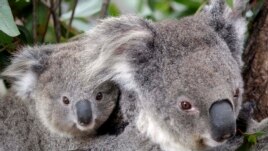26 September 2021
The Australian Koala Foundation says Australia has lost about 30 percent of its koalas over the past three years. The non-profit group says drought, wildfires and development projects played a part in the drop in the koala population. They are urging the government to do more to protect the creature's environment.
The group estimated the koala population has dropped to less than 58,000 this year from more than 80,000 in 2018. The biggest decrease was in the state of New South Wales, where the numbers have dropped by 41 percent.
Deborah Tabart leads the Australian Koala Foundation. She called the drop "quite dramatic."

Maggie, a female koala, climbs a tree with her joey at Taronga Zoo in Sydney, Australia, Thursday, September 1, 2011. (AP Photo/Rob Griffith)
Only one area in the study was estimated to have more than 5,000 koalas. Some areas were estimated to have as few as five or 10.
Tabart said the country needs a koala protection law.
She added, "What we're concerned about is places like western New South Wales where the drought over the last ten years has just had this cumulative effect - river systems completely dry for years, river [red gum plants], which are the lifeblood of koalas, dead."
The loss in New South Wales likely sped up after large forest areas were destroyed by wildfires in late 2019 and early 2020. But some of those areas already had no koalas.
Land clearing by property developers and road builders has also destroyed the koala's environment.
"I think everyone gets it, we've got to change. But if those bulldozers keep working, then I really fear for the koalas," Tabart said.
I'm Jonathan Evans.
James Redmayne reported on this story for the Reuters news service. Jonathan Evans adapted this story for Learning English. Caty Weaver was the editor.
________________________________________________
Words in This Story
drought – n. a long period of time during which there is very little or no rain
dramatic – adj. sudden and extreme
cumulative – adj. increasing or becoming better or worse over time through a series of additions
lifeblood – n. the most important part of something; the part of something that provides its strength and energy
bulldozer – n. a powerful and heavy vehicle that has a large curved piece of metal at its front and that is used for moving dirt and rocks and pushing over trees and other structures